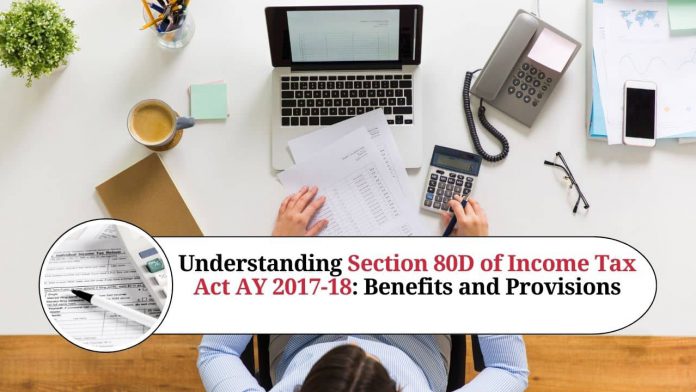Section 80D of the Income Tax Act AY 2017-18 provides tax benefits to individuals and Hindu Undivided Families (HUFs) who pay medical insurance premiums or make contributions towards a health scheme. This section provides a deduction from taxable income for such payments, thereby reducing the tax liability of the taxpayer. Let’s dive deeper into the provisions of Section 80D and the benefits it offers.
What is Section 80D?
Section 80D of the Income Tax Act, of 1961, allows individuals and HUFs to claim deductions on the premium paid towards medical insurance policies or health schemes. The deductions are available on the premium paid for the taxpayer, their spouse, dependent children, and dependent parents. The maximum deduction limit varies based on the age of the individual and the type of premium paid.
Deduction Limits under Section 80D
The deduction limit for Section 80D is as follows:
- For individuals below 60 years of age, the deduction limit is Rs. 25,000 for themselves, their spouses, and dependent children. An additional deduction of Rs. 25,000 can be claimed for the premium paid towards the medical insurance of their parents. If the parents are senior citizens (above 60 years of age), the deduction limit is increased to Rs. 50,000.
- For senior citizens (above 60 years of age), the deduction limit is Rs. 50,000 for themselves, their spouses, and dependent children. An additional deduction of Rs. 50,000 can be claimed for the premium paid towards the medical insurance of their parents.
Note: If both the individual and their parents are senior citizens, the maximum deduction limit can go up to Rs. 1 lakh.
Eligible Medical Insurance Policies and Health Schemes
To claim the deduction under Section 80D, the medical insurance policy or health scheme must fulfill the following conditions:
- The policy should be taken from an insurer registered with the Insurance Regulatory and Development Authority (IRDA).
- The premium should be paid by any mode of payment other than cash.
- The policy should be in the name of the taxpayer, their spouse, or dependent children.
- The policy should cover the taxpayer, their spouse, and dependent children.
Benefits of Section 80D
- Tax Benefits: Section 80D provides a deduction from taxable income for the premium paid towards medical insurance policies or health schemes. This reduces the tax liability of the taxpayer.
- Health Protection: By taking a medical insurance policy or contributing towards a health scheme, the taxpayer can ensure that they and their family members are financially protected against any medical emergency.
- Senior Citizen Benefits: Senior citizens are eligible for a higher deduction limit under Section 80D, making it easier for them to afford medical insurance premiums.
Final Conclusion
Section 80D of the Income Tax Act AY 2017-18 provides significant tax benefits to individuals and HUFs who take medical insurance policies or contribute towards health schemes. By doing so, they not only reduce their tax liability but also ensure that they and their family members are financially protected against any medical emergency. Taxpayers should take advantage of this provision and invest in a suitable medical insurance policy or health scheme to secure their future.
Other Related Blogs: Section 144B Income Tax Act
Frequently Asked Questions:
Q:1 What is Section 80D of the Income Tax Act?
A: Section 80D of the Income Tax Act is a tax deduction provision that allows an individual to claim tax benefits on payments made towards health insurance premiums, preventive health check-ups, and medical expenses.
Q:2 Who can claim a tax deduction under Section 80D?
A: Any individual or Hindu Undivided Family (HUF) can claim a tax deduction under Section 80D of the Income Tax Act.
Q:3 What is the maximum tax deduction allowed under Section 80D?
A: The maximum tax deduction allowed under Section 80D is up to Rs. 25,000 for individuals and HUFs on payments made towards health insurance premiums for self, spouse, and dependent children. An additional deduction of Rs. 25,000 can be claimed on payments made towards health insurance premiums for parents. In case the parents are senior citizens, the maximum deduction amount is Rs. 50,000.
Q:4 Can an individual claim a tax deduction for preventive health check-ups?
A: Yes, an individual can claim a tax deduction of up to Rs. 5,000 for preventive health check-ups for a self, spouse, dependent children, and parents. This deduction is within the overall limit of Rs. 25,000 or Rs. 50,000, as the case may be.
Q:5 Are medical expenses also eligible for tax deduction under Section 80D
A: Yes, medical expenses incurred on the treatment of self, spouse, dependent children, and parents are eligible for tax deduction under Section 80D. However, this deduction is limited to Rs. 50,000 in case the person for whom the medical expenses are incurred is a senior citizen.
Q:6 Can an individual claim a tax deduction under both Section 80C and Section 80D?
A: Yes, an individual can claim a tax deduction under both Section 80C and Section 80D of the Income Tax Act. However, the maximum combined deduction amount under these two sections cannot exceed Rs. 1,50,000.
Q:7 What documents are required to claim a tax deduction under Section 80D?
A: The following documents are required to claim a tax deduction under Section 80D:
- Health insurance premium payment receipts
- Receipts for preventive health check-ups
- Medical bills and receipts for medical expenses incurred
Q:8 Can a tax deduction be claimed on health insurance premiums paid for siblings?
A: No, a tax deduction cannot be claimed on health insurance premiums paid for siblings under Section 80D of the Income Tax Act. The deduction can only be claimed on payments made towards health insurance premiums for a self, spouse, dependent children, and parents.




















